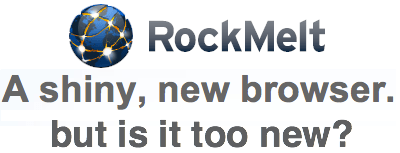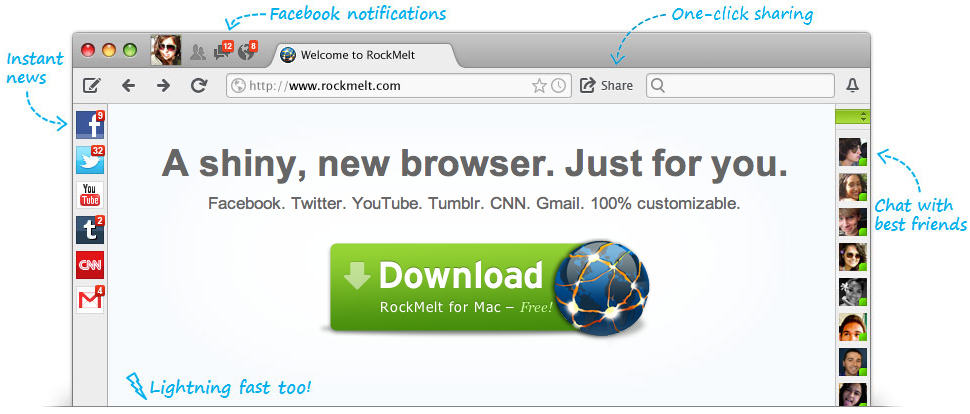6 months after its public launch, the RockMelt social web browser now has 1.4 million registered users and several hundred thousand weekly active users, CEO and co-founder Eric Vishria told me this morning. With Internet Explorer and Firefox on the decline, RockMelt’s 2012 will be defined by competition with Chrome. Google’s browser is moving in the direction of RockMelt, adding login for personalization and an app store. To stay unique, Vishria says “I think we should push further ahead”, building radical new features “everyone will ultimately want”. But will RockMelt arrive too early to the browser revolution?
Finding the right design to make deep functionality easily accessible is the goal of RockMelt 5 beta, which will be released on Wednesday. The team is aiming for Apple-esque intuitive design. “We haven’t gotten gotten to the ‘iPhone of the browser space’, but that’s where the future lies,” says Vishria
Fortunately, RockMelt’s user base is young and highly adaptive, with 60% under age 25. They have the highest retention, use its special features the most, and invite friends to download RockMelt the most. Vishria seemed very excited about this, “If you’re building a browser for the next generation, it’s good to see the next generation using it.”
The average RockMelt user has the browser installed on 1.3 machines, and uses it for 7 hours a day. They have 12 apps installed, use them 26 times a day, and have 7 chat conversations a day up, from 3 just six months ago. These engagement stats are nice, but user acquisition and retention is where the service has had trouble. I’ve used all the iterations and haven’t been convinced to stick with it yet.

To leapfrog Chrome and accelerate the shift to more personalized, social browser, Vishria says RockMelt is focusing on 3 key areas:
- Identity – Personalizing the home page with pictures of friends, most visited sites, and more
- Content and Apps – Working with third-party content providers to create apps that offer a rapid consumption experience, an evolution of RSS
- Communication – Using enhanced type-ahead people search to make it easier to view, message, chat, wall post, or otherwise stay in touch with friends
RockMelt has also started to monetize its users, though this depends on its competitor Google. When people search through the RockMelt address bar, Google search results are shown generating a few dollars per user a year. Thanks to its $40 million in funding, monetization doesn’t have to be a priority right now. Instead, Vishria tells me the agenda is “Product. Distribution. Monetization. The big opportunity is in getting to hundreds of millions of users.”
I have reservations about RockMelt reaching this goal, though. Pioneering the future of the browser and attaining a mainstream audience may be fundamentally at odds. Chrome doubled its market share to 25% this year through speed and simplicity, not features.

